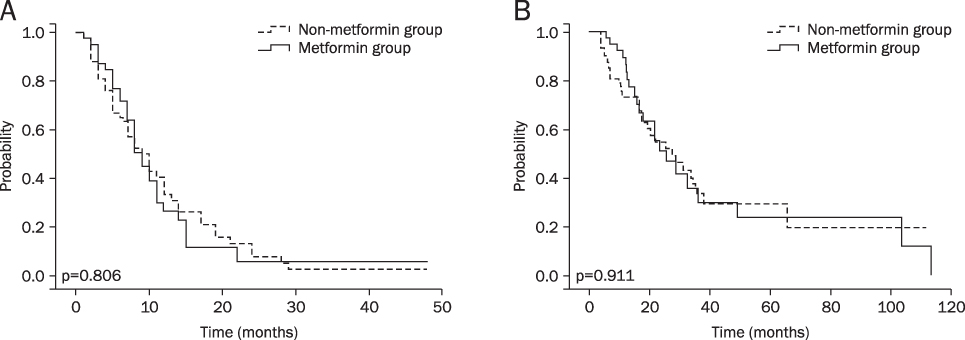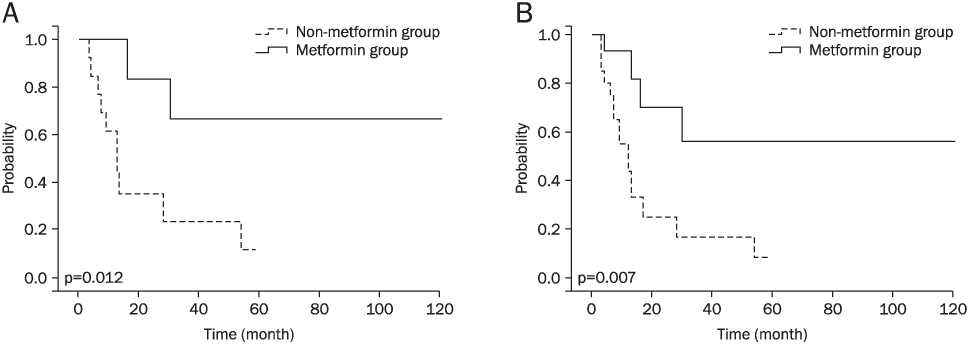Korean J Gastroenterol.
2012 Dec;60(6):355-361. 10.4166/kjg.2012.60.6.355.
The Effect of Metformin on Responses to Chemotherapy and Survival in Stage IV Colorectal Cancer with Diabetes
- Affiliations
-
- 1Department of Internal Medicine and Institute of Gastroenterology, Yonsei University College of Medicine, Seoul, Korea. taeilkim@yuhs.ac
- KMID: 1773071
- DOI: http://doi.org/10.4166/kjg.2012.60.6.355
Abstract
- BACKGROUND/AIMS
Metformin is known to lower the risk of cancer and cancer mortality. However, the effect of metformin in stage IV colorectal cancer (CRC) patients with diabetes mellitus (DM) remains unknown. The aim of this study was to evaluate the effect of metformin on tumor response and survival in stage IV CRC patients with DM.
METHODS
We identified 106 patients who were diagnosed with both stage IV CRC and DM (81 patients who underwent palliative chemotherapy and 25 patients who underwent curative resection). Retrospective data of each patient's clinical characteristics, tumor response, and survival rate were compared between two groups of patients who either were or were not administered metformin.
RESULTS
For the palliative chemotherapy group, tumor response, change in target lesion size, progression free survival rate, and overall survival rate were not significantly different between the metformin group and the non-metformin group on univariate and multivariate analysis. For the curative resection patient group, metformin use was associated with increased disease free survival on univariate analysis (p=0.012) and multivariate analysis (hazard ratio, 0.024; 95% CI 0.001-0.435; p=0.010), but not with overall survival.
CONCLUSIONS
Metformin use in stage IV CRC patients with diabetes was shown to be associated with a lower risk of tumor recurrence after curative resection.
Keyword
MeSH Terms
-
Adult
Aged
Aged, 80 and over
Antineoplastic Agents/therapeutic use
Colorectal Neoplasms/drug therapy/*mortality/pathology
Diabetes Mellitus/*drug therapy
Disease-Free Survival
Female
Humans
Hypoglycemic Agents/*therapeutic use
Male
Metformin/*therapeutic use
Middle Aged
Multivariate Analysis
Neoplasm Staging
Palliative Care
Retrospective Studies
Survival Rate
Antineoplastic Agents
Hypoglycemic Agents
Metformin
Figure
Reference
-
1. Siegel R, Naishadham D, Jemal A. Cancer statistics, 2012. CA Cancer J Clin. 2012. 62:10–29.2. Anderson WF, Umar A, Brawley OW. Colorectal carcinoma in black and white race. Cancer Metastasis Rev. 2003. 22:67–82.3. Levine W, Dyer AR, Shekelle RB, Schoenberger JA, Stamler J. Post-load plasma glucose and cancer mortality in middle-aged men and women. 12-year follow-up findings of the Chicago Heart Association Detection Project in Industry. Am J Epidemiol. 1990. 131:254–262.4. Saydah SH, Loria CM, Eberhardt MS, Brancati FL. Abnormal glucose tolerance and the risk of cancer death in the United States. Am J Epidemiol. 2003. 157:1092–1100.5. Weiderpass E, Gridley G, Nyrén O, Ekbom A, Persson I, Adami HO. Diabetes mellitus and risk of large bowel cancer. J Natl Cancer Inst. 1997. 89:660–661.6. Coughlin SS, Calle EE, Teras LR, Petrelli J, Thun MJ. Diabetes mellitus as a predictor of cancer mortality in a large cohort of US adults. Am J Epidemiol. 2004. 159:1160–1167.7. Meyerhardt JA, Catalano PJ, Haller DG, et al. Impact of diabetes mellitus on outcomes in patients with colon cancer. J Clin Oncol. 2003. 21:433–440.8. Currie CJ, Poole CD, Gale EA. The influence of glucose-lowering therapies on cancer risk in type 2 diabetes. Diabetologia. 2009. 52:1766–1777.9. Dehal AN, Newton CC, Jacobs EJ, Patel AV, Gapstur SM, Campbell PT. Impact of diabetes mellitus and insulin use on survival after colorectal cancer diagnosis: the Cancer Prevention Study-II Nutrition Cohort. J Clin Oncol. 2012. 30:53–59.10. Seow A, Yuan JM, Koh WP, Lee HP, Yu MC. Diabetes mellitus and risk of colorectal cancer in the Singapore Chinese Health Study. J Natl Cancer Inst. 2006. 98:135–138.11. Atchison EA, Gridley G, Carreon JD, Leitzmann MF, McGlynn KA. Risk of cancer in a large cohort of U.S. veterans with diabetes. Int J Cancer. 2011. 128:635–643.12. Witters LA. The blooming of the French lilac. J Clin Invest. 2001. 108:1105–1107.13. Sarbassov DD, Ali SM, Sabatini DM. Growing roles for the mTOR pathway. Curr Opin Cell Biol. 2005. 17:596–603.14. Libby G, Donnelly LA, Donnan PT, Alessi DR, Morris AD, Evans JM. New users of metformin are at low risk of incident cancer: a cohort study among people with type 2 diabetes. Diabetes Care. 2009. 32:1620–1625.15. Bowker SL, Majumdar SR, Veugelers P, Johnson JA. Increased cancer-related mortality for patients with type 2 diabetes who use sulfonylureas or insulin. Diabetes Care. 2006. 29:254–258.16. Bowker SL, Yasui Y, Veugelers P, Johnson JA. Glucose-lowering agents and cancer mortality rates in type 2 diabetes: assessing effects of time-varying exposure. Diabetologia. 2010. 53:1631–1637.17. Evans JM, Donnelly LA, Emslie-Smith AM, Alessi DR, Morris AD. Metformin and reduced risk of cancer in diabetic patients. BMJ. 2005. 330:1304–1305.18. Landman GW, Kleefstra N, van Hateren KJ, Groenier KH, Gans RO, Bilo HJ. Metformin associated with lower cancer mortality in type 2 diabetes: ZODIAC-16. Diabetes Care. 2010. 33:322–326.19. Algire C, Amrein L, Zakikhani M, Panasci L, Pollak M. Metformin blocks the stimulative effect of a high-energy diet on colon carcinoma growth in vivo and is associated with reduced expression of fatty acid synthase. Endocr Relat Cancer. 2010. 17:351–360.20. Bojkova B, Orendas P, Garajova M, et al. Metformin in chemically-induced mammary carcinogenesis in rats. Neoplasma. 2009. 56:269–274.21. Hosono K, Endo H, Takahashi H, et al. Metformin suppresses azoxymethane-induced colorectal aberrant crypt foci by activating AMP-activated protein kinase. Mol Carcinog. 2010. 49:662–671.22. Tomimoto A, Endo H, Sugiyama M, et al. Metformin suppresses intestinal polyp growth in ApcMin/+ mice. Cancer Sci. 2008. 99:2136–2141.23. Hosono K, Endo H, Takahashi H, et al. Metformin suppresses colorectal aberrant crypt foci in a short-term clinical trial. Cancer Prev Res (Phila). 2010. 3:1077–1083.24. Lee JH, Kim TI, Jeon SM, Hong SP, Cheon JH, Kim WH. The effects of metformin on the survival of colorectal cancer patients with diabetes mellitus. Int J Cancer. 2012. 131:752–759.25. Eisenhauer EA, Therasse P, Bogaerts J, et al. New response evaluation criteria in solid tumours: revised RECIST guideline (version 1.1). Eur J Cancer. 2009. 45:228–247.26. Shaw RJ, Lamia KA, Vasquez D, et al. The kinase LKB1 mediates glucose homeostasis in liver and therapeutic effects of metformin. Science. 2005. 310:1642–1646.27. Zakikhani M, Dowling R, Fantus IG, Sonenberg N, Pollak M. Metformin is an AMP kinase-dependent growth inhibitor for breast cancer cells. Cancer Res. 2006. 66:10269–10273.28. Ben Sahra I, Laurent K, Giuliano S, et al. Targeting cancer cell metabolism: the combination of metformin and 2-deoxyglucose induces p53-dependent apoptosis in prostate cancer cells. Cancer Res. 2010. 70:2465–2475.29. Oliveras-Ferraros C, Vazquez-Martin A, Menendez JA. Genome-wide inhibitory impact of the AMPK activator metformin on [kinesins, tubulins, histones, auroras and polo-like kinases] M-phase cell cycle genes in human breast cancer cells. Cell Cycle. 2009. 8:1633–1636.30. Phoenix KN, Vumbaca F, Claffey KP. Therapeutic metformin/AMPK activation promotes the angiogenic phenotype in the ERalpha negative MDA-MB-435 breast cancer model. Breast Cancer Res Treat. 2009. 113:101–111.31. Pollak M. Insulin and insulin-like growth factor signalling in neoplasia. Nat Rev Cancer. 2008. 8:915–928.32. Rozengurt E, Sinnett-Smith J, Kisfalvi K. Crosstalk between insulin/insulin-like growth factor-1 receptors and G protein-coupled receptor signaling systems: a novel target for the antidiabetic drug metformin in pancreatic cancer. Clin Cancer Res. 2010. 16:2505–2511.33. Vazquez-Martin A, Oliveras-Ferraros C, Menendez JA. The antidiabetic drug metformin suppresses HER2 (erbB-2) oncoprotein overexpression via inhibition of the mTOR effector p70S6K1 in human breast carcinoma cells. Cell Cycle. 2009. 8:88–96.34. Hirsch HA, Iliopoulos D, Tsichlis PN, Struhl K. Metformin selectively targets cancer stem cells, and acts together with chemotherapy to block tumor growth and prolong remission. Cancer Res. 2009. 69:7507–7511.
- Full Text Links
- Actions
-
Cited
- CITED
-
- Close
- Share
- Similar articles
-
- What Is the Effect of Metformin Combined to Chemotherapy in Stage IV Colorectal Cancer with Diabetes?
- Inhibitory Effect of Metformin Therapy on the Incidence of Colorectal Advanced Adenomas in Patients With Diabetes
- Meta-analysis of oncologic effect of primary tumor resection in patients with unresectable stage IV colorectal cancer in the era of modern systemic chemotherapy
- Chemoprevention of Gastric Cancer: Metformin
- Metformin and Cancer in Type 2 Diabetes



